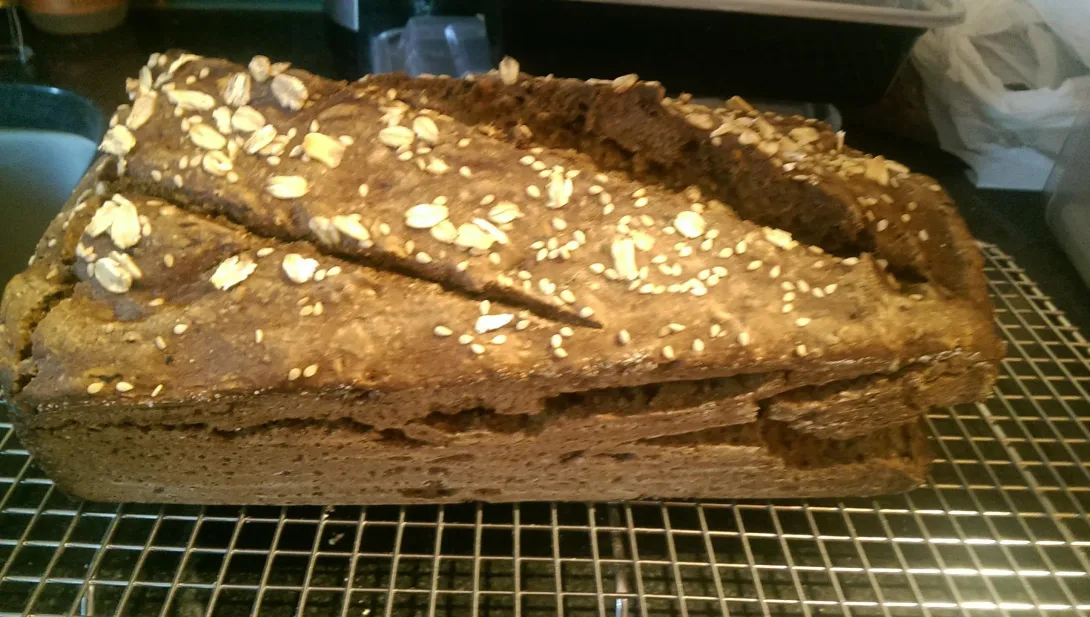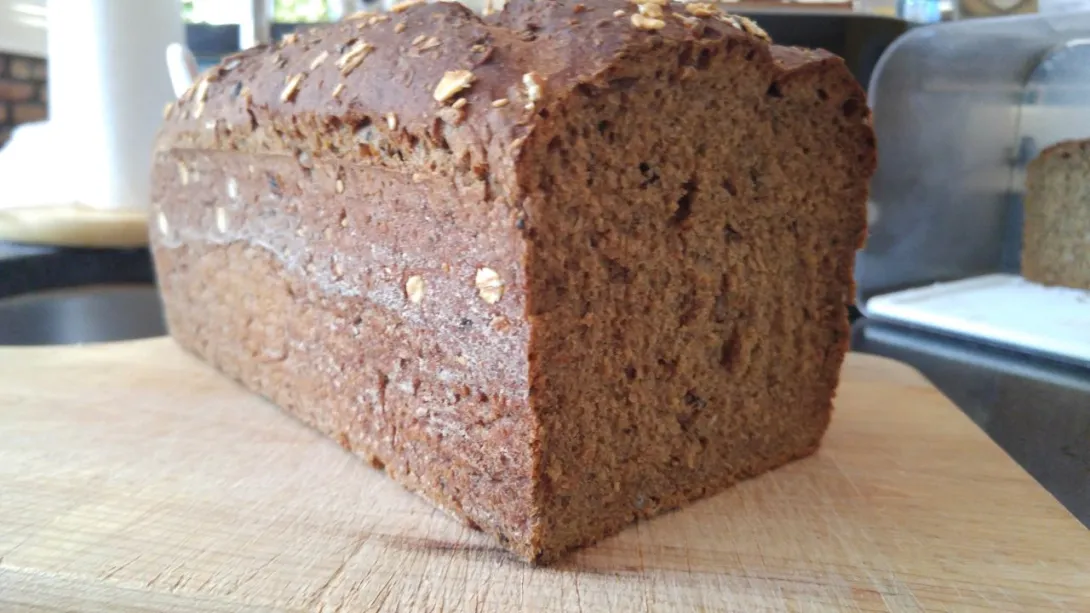
been using my slow rise AP starter and tried this time out to use no yeast at all.
Previously I'd used a tsp and got decent results, not great as far as the height of the baked loaf.
the starter was active, but slow, say 4 hours to double.
the recipe is the same:
2c starter (90%)
2c bread
3/4c ww
1/2c rye
3/4c oats
1/4c teff
1/4c buckwheat
tsp barley malt powder
tbsp vit C gluten.
~1.25c total - water and beer
2.5 tsp salt
made the dough but ran out of time and decided to fridge the dough till morning.
took it out on the counter for a couple hours then into the oven with only some boiled water for a little more rise time.
didn't seem to be doing much. yet here is the result.
is it that I need to wait longer after the fridge or not fridge and wait longer or any other suggestion.
It only seems slow if you compare it to commercial yeast.
This would be a lot easier to diagnose if the measurements were in weight, instead of volume. Have you weighed your starter ingredients to know that it is 90% hydration?
Since I don't have time just now to do the calculations, I'll offer some general observations.
First, the ingredients. Between the rye, the oats, the teff, and the buckwheat, you have several things with low or no gluten. They won't contribute to a light, fluffy crumb. I know vitamin C and I know gluten but I don't know what vit C gluten is. Can you clarify, please? Aside from the starter, there are 4.5 cups of flours and 1.25 cups of water/beer. That would make a very stiff, dry dough on its own. The starter will contribute additional moisture, as well as flour, which will help some but might not be enough when you consider that several of the flours are whole grain flours that absorb a lot of moisture.
Second, the process. I understand you to say that you put the dough into the refrigerator immediately after it was mixed and kneaded. Is that correct? If so, there was probably little to no fermentation of the dough, given sourdough's sensitivity to low temperatures. I don't see mention of both a bulk ferment and final ferment. Was the dough shaped straight from the refrigerator and left for 2 hours at room temperature and a "little more" (how much?) in the warmed oven? If so, it probably hadn't risen much, if at all, before it was baked. Would you describe how much the dough expanded before it was baked, please?
Until I have a better understanding of what did or didn't happen, I'll refrain from offering suggestions that might not be helpful.
Paul
Thanks Paul.
I did weigh the starter as I built and I'm fairly certain it was 90%.
Vit C Gluten is a Hodgeson product.
I know the teff and buckwheat drink like fish, which is one reason why they are smaller parts of the recipe.
I put the dough in the loaf pan, topped and scored it, then put in in the fridge overnight.
After 2 hours on the counter it was another 2 hours in the oven with the bowl of boiled water.
When the bake started, you are correct, the rise wasn't much, perhaps a 1/2".
Not like what I saw last time with the same recipe augmented with a tsp of yeast.
That had risen more.
The finished bake pict above was barely 1/2" out of the pan.
Wow! It looks like it barely rose. I don't think your starter survived the night in the refrigerator.
It is easier to get a sense of the amounts and hydration if you weigh the ingredients instead of using volume measurements.
What is the purpose of using buckwheat, teff, rye and oats? Are you wanting to make a sandwich loaf or more freeform? Are you handmixing or using a stand mixer? How does the dough look and feel when it is done mixing. Are you able to pull a windowpane or see the gluten development? When it rose was it soft? Hard? Was it extensible or stiff? Did it double?
So many questions.
yea, I think I will have to go with weights as I think the teff and buckwheat are in particular, throwing things off.
Sandwich loaf. Bosch C7.
Looks and feels great, not too moist or dry. Never tried the windowpane with this one as I figured that might not work with all the "alt" flours. (a sad excuse for sure)
It was soft post rise, but stiff. No where near doubled, which in previous versions (with a bit of yeast), had no problem.
Like you I dove head first into sourdough and wanted to create the most elaborate of breads. Believe you me that the learning curve is much steeper if one starts off simple.
finally got a balance between sponge, (added) yeast and liquid.
I ended up with about 1/4c additional liquid to balance the thirst of buckwheat and teff, and 2 tbsp gluten w/vit C.
As well as a 1/4 tsp yeast.
Slow (fridged) rise for about 3 hours (while I ran my day), then steam rise in a cooler for a couple hours.
I also found that the sponge did better with less to start with; 2 tbsp of each of the mothers, white and rye, and 37g of AP and warm water to feed. 3 feeds over 2 days in it was hoppin'!
Image
